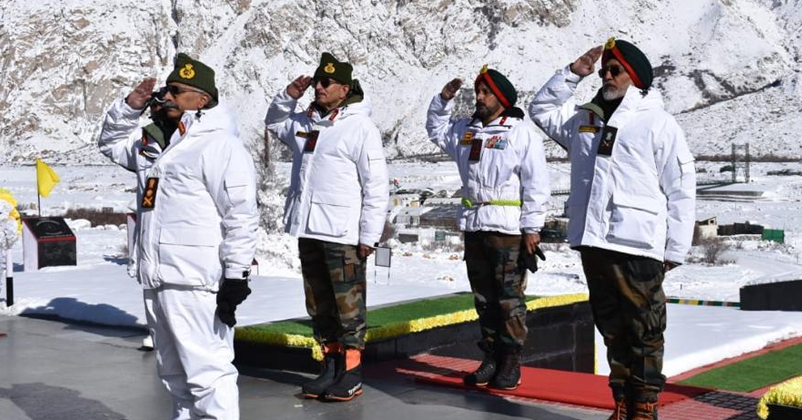What are chances of demilitarisation of Siachen?
| 17-Jan-2022 |

By Sant Kumar Sharma
On January 13, in the run-up to Army Day (January 15), Indian Army chief General M M Narvane talked about Siachen. The possibility of Indian and Pakistan forces disengaging on the icy heights, called the world’s highest battlefield. His offer of the India forces withdrawing from the glacier came with a rider that Pakistan first needs to sign on the dotted line! What is the dotted line here? Well, it is fulfilling certain conditions regarding the verification of AGPL (Actual Ground Position Lines).
This may be an exciting possibility and it doesn’t look like a sudden announcement on his part, without any political clearance. So far, Union Defence Minister Rajnath Singh, to whom General Narvane is answerable, has not spoken on the issue. Nor has Prime Minister Narendra Modi offered any comment on Siachen or the possibility of its demilitarisation. That means from the Indian side, General Narvane had the tacit approval of the country’s political leadership on the issue.
It is worth mentioning that occupying the glacier costs crores of rupees to both the sides, be it the Indian Army, or the Pakistani troops deployed in various sectors there. For a couple of decades now, no skirmishes have taken place between the two sides, and both maintain dominance of the areas they are occupying. Yet, both sides have faced hundreds of casualties since the glacier became militarised, mainly in 1984, when the Indian troops occupied some vantage points, pre-empting Pakistanis by a whisker.
It was then said that if India had failed to occupy prime positions, Pakistan was planning to move own troops and done so. Repeated efforts by the Pakistani side to dislodge the Indian Army resulted in failure, and the Indian troops have consolidated their positions. On the Indian side, a posting or tenure on Siachen (called glacier among soldiers more commonly) is the still considered the toughest posting. This despite tremendous improvements in warm clothing, food supplies, healthcare, evolved training protocols and other things.
Interestingly, there has not been any official Pakistan reaction to General Narvane’s proposal, or rather views made public the other day. There have been some write-ups in leading newspapers of Pakistan though on this subject, and some in Indian newspapers too.
In 2006, India and Pakistan were considered close to a deal on Siachen which could have led to disengagement. But at the last moment, a couple of top Indian officials, mainly Indian Security Advisor M K Narayanan and then Army chief General J J Singh. Once these two top Indians had opposed the move to demilitarise Siachen saying ``Pakistan can’t be trusted’’ or words to that effect, Prime Minister Manmohan Singh did not take things forward. Whatever be the reason of Manmohan’s remaining silent at that juncture, all talks of Siachen being resolved evaporated.
The efforts to demilitarise were rooted in initial suggestions made by the Indian Prime Minister Rajiv Gandhi! This only goes on to show how difficult and complicated things could be if trust in one another is not there at the diplomatic level. Lack of trust in one another’s assurances, or actions, is a trait displayed by both sides here, India as also Pakistan.
A couple of retired officers of the Indian Army, who have done tenures on Siachen, but did not want to be identified, said that General Narvane’s proposal can help troops on both sides. ``Nature is the worst enemy on the glacier, not necessarily the soldier deployed on the opposite side. Both sides have lost more soldiers year after year to the vagaries of weather, than firing from the other side,’’ an officer who had commanded troops on the glacier around two decades ago said.
With Pakistan announcing a new national security policy some days ago, is it time for Siachen to be taken for discussions, whether upfront, or in Track II talks? May be. May be not. A narrative had been built, both by India and Pakistan, describing Siachen as a ``low hanging fruit’’, implying that it could be easily picked up and the benefits could accrue to both sides. That description proved to be wrong later and any possible demilitarisation chances look remote.
The Pakistan side had for a long time said that no negotiations were possible with Modi government till it reversed August 5, 2019, changes regarding Jammu and Kashmir. Suddenly, it has backtracked on its earlier stance and said that it wants to focus on geo-economics and trade, rather than geo-politics. Can Siachen be the first point where geo-politics is given the go-by? We may know soon.